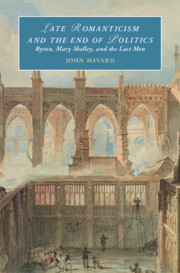Book contents
- Late Romanticism and the End of Politics
- Cambridge Studies in Romanticism
- Late Romanticism and the End of Politics
- Copyright page
- Contents
- Figures
- Acknowledgments
- Abbreviations
- Introduction Where Will It End?
- Chapter 1 The End of Politics and the End of the World
- Chapter 2 The Last Whigs
- Chapter 3 Byron, Brougham, and the End of Slavery
- Chapter 4 “Crowns in the Dust”
- Chapter 5 New Worlds
- Coda
- Notes
- Bibliography
- Index
- Cambridge Studies in Romanticism
Chapter 3 - Byron, Brougham, and the End of Slavery
Published online by Cambridge University Press: 06 April 2023
- Late Romanticism and the End of Politics
- Cambridge Studies in Romanticism
- Late Romanticism and the End of Politics
- Copyright page
- Contents
- Figures
- Acknowledgments
- Abbreviations
- Introduction Where Will It End?
- Chapter 1 The End of Politics and the End of the World
- Chapter 2 The Last Whigs
- Chapter 3 Byron, Brougham, and the End of Slavery
- Chapter 4 “Crowns in the Dust”
- Chapter 5 New Worlds
- Coda
- Notes
- Bibliography
- Index
- Cambridge Studies in Romanticism
Summary
At once a “burlesque” of literary forms including the historical novel and a satire of political “bigwigs,” Whitehall (1827) looked back at early nineteenth-century London from an imagined future.1 But in contrast with many accounts of those decades then and since, Irish-born author William Maginn gave the abolition of slavery a crucial role in the politics of the period. The novel imagines a freed Jamaican man (and his enslaved servant) visiting the center of power, where concern about unrest in the West Indies has become palpable. “At that period,” the narration states, “the fermentation of popular sentiment in the Antillic Colonies was at its height,” while a veteran member of the Admiralty remarks that “the case is plain”: “Barbadoes [sic], Demerara, Jamaica herself, are on the eve of insurrection!” It was not “from the Caribbean colonies alone that the proud supremacy of the English tyranny was menaced,” but also the “millions” agitating nearer home.
- Type
- Chapter
- Information
- Late Romanticism and the End of PoliticsByron, Mary Shelley, and the Last Men, pp. 79 - 106Publisher: Cambridge University PressPrint publication year: 2023



